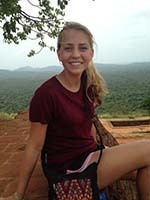
Rebecca Blais
Class of 2018
Political Science & Peace Studies
Rebecca Blais, a current sophomore from New Smyrna Beach, FL, was introduced to Notre Dame in 2012 when she first visited the campus. Upon arrival, she fell in love with the school - its culture, mission, academics, and most importantly, its people. From that point on, her life was never the same.
Flash forward to two years later - Fall, 2014 - when she set foot on the campus again, this time as an undergraduate student. Although Rebecca adjusted her intended major and studies according to her newfound interests and ignited passions, she eventually settled on a course of study that would combine political science, psychology, and sustainability studies.
While freshman year brought with it new and exciting fields of study, engaging discussions with peers, collegiate events, and more, the most valuable aspect of Rebecca’s time at Notre Dame became the friends she made with whom she shared in the first year experience. One of these friends was a young man named Jeevith from Sri Lanka. Due to the fact that Thanksgiving break lasted only a few short days and the cost (and in Jeevith’s case, length) of the flight home, she and Jeevith ended up spending Thanksgiving together with two other friends.
During that time, Jeevith and Rebecca had the opportunity to get to know one another, sharing their unique experiences from their respective homes and families. As Jeevith shared more with Rebecca about his home in Sri Lanka, her curiosity grew.
Once they returned to campus after the holiday, Jeevith and Rebecca continued their conversation, and Jeevith shared with her how she could read the daily Sri Lankan news. Immediately, she noticed a common thread in the reported stories:
“I kept seeing all of these stories about elephants, so I asked Jeevith if he could tell me more on the subject and why they continued to appear in the headlines; he told me elephants were pests."
Rebecca was shocked.
“Weasels and skunks are pests, not elephants.”
Further conversation with Jeevith concerning the strained relationship between humans and elephants in Sri Lanka peaked Rebecca’s interest; naturally, she took to Google with her lingering questions. In conducting this research, she discovered the Sri Lankan Wildlife Conservation Society (SLWCS), an organization tackling the very issues that had initially interested her. She reached out to the SLWCS, hoping to identify a concrete way in which she could personally further their efforts.
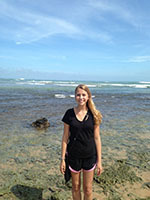
Rebecca in Sri Lanka
Though only months into her first year of college, Rebecca was determined to affect change on a global scale.
“The way I see my time here is that I only have four years. Why waste any of it? If Notre Dame can help me to research and to learn more about another country - to dig deeper - then I absolutely want to take advantage of that.”
In exploring her options that would make her dreams of international travel and research a reality, Rebecca visited the Center for Undergraduate Scholarly Engagement (CUSE) after hearing about it from a friend. She had seen posters and handouts about CUSE, and when she finally looked into it, it seemed to be the perfect fit. She crafted a strong grant proposal, submitted it, and then waited.
Rebecca applied to several other funding agencies on campus as well. When she heard “no” from the first one, she thought her chances were over. Her mind then turned to internships instead, but her faculty mentor, Dr. Anré Venter, strongly encouraged her to keep pursuing this research opportunity.
April rolled around and one day, while walking to gym class, Rebecca pulled up her emails on her phone and, much to her amazement, discovered a long-awaited message from CUSE and the First Year of Studies granting her funding for her research proposal.
“People probably thought I was crazy because when I read that email on the way to class, I flipped out. Passersby were staring but I didn’t care because I was so excited.”
She was going to Sri Lanka.
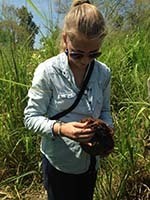
Rebecca completing a
transact.
Rebecca finished up her freshman year courses, and got ready to go and experience her first time as a solo-traveler abroad. After a grand total of 25 hours in the air and many more passing through international airports, she arrived in Colombo, the capital of Sri Lanka. Her arrival was greeted by a taxi driver holding a sign with her name on it, the only preliminary travel arrangement she had made. After another three hours in transit, she arrived in Kandy, the cultural heart of the country, where she would essentially spend her first week.
The next steps included settling into her hostel and acclimating to a new culture - one in which English was not commonly spoken. She met some fellow international travelers that first day, and together she and a small group of new friends decided to climb Adam’s Peak that night, a journey that continued well into the following day.
At the outset, it took five hours of traveling to get to the mountain. At that time the tourist cycle was in its “off-season,” so there weren’t any vendors at the mountain's base and the newly-acquainted traveling companions were able to promptly embark on their upward climb.
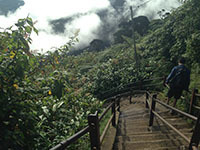
Climbing Adam's Peak
To reach the peak, it took about five thousand steps up the stairs carved into the side of the mountain. It rained the entire time the small group climbed - they managed to get lost and pick up an accompanying stray dog, and the many thousands of steps wore on their bodies - but they pushed onward until they were able to break through the clouds and reach the peak in time for sunrise.
“It was the most incredible thing I had ever seen. It’s called Adam’s Peak because the legends say that Adam stood atop this mountain and looked out at the Garden of Eden, and it’s unbelievably beautiful.”
Rebecca and her friends made their way back down the mountain after sunrise.
“At that point, it wasn’t dark anymore. The day was alive, so you could see everything, such as all the people picking tea. That downward hike really alerted me to the country, especially with the tea farming - to see people with huge bags on their backs picking little tiny leaves so that everybody in America can drink Lipton.”
After climbing Adam’s Peak, exploring the ins and outs of Kandy, traveling by train to the southern region of the country, and scattered adventures - all of which she considered crucial context for her research - Rebecca made her way to the upper Hill County, where she would be conducting the bulk of her research.
“Once I got to the field house where my research was based from, I found that I could truly relate to people because I had been to their hometowns, or had some other shared experience we could connect on. It made mutual communication much easier.”
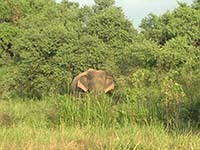
An elephant on Rebecca's watch
Rebecca planned to study the human-elephant conflict: an issue that is based on the fact that the human population in Sri Lanka is steadily growing, which causes humans and wild elephants to come into contact more than ever before. Forests and fields are being converted from elephant territory into cropland, which means that the elephants are more likely to invade the rice paddies, fruit, and vegetable fields in search of food. This becomes a problem for the rural farmers because in a single night, a herd of elephants can destroy their entire crop yield and livelihood. The farmers are unable to keep the elephants out with electric fences, and as a result they have taken to shooting and dropping firecrackers on the elephants, often harming them.
To collect data on this conflict, Rebecca spent two weeks living in a field house next to the Wasgamuwa National Park, where she completed what was called a “transact” in the mornings and made observations from a nearby tree hut in the evenings. The transacts were trails that led her through heavily-trafficked elephant areas that she would hike with the local coordinators from the SLWCS .
“Sometimes the grass was so tall that you couldn’t even see the elephants in it,” Rebecca reflected.
They would survey the ground looking for elephant dung, and when they found it, they would measure and dissect it. Depending on what food remains they found, they could determine whether or not the elephants had gotten into the local farmers' crops. Measuring the circumference of the dung is a technique which helped them determine the age and gender of the elephant.
“We would pick apart the dung, looking for evidence of what they had eaten. There would be mana, grass, and teak – good things. But then sometimes you find banana peels, or eggplant seeds, or rice, which meant that the elephants had gotten into the fields. Sometimes you would even find trash, which was very bad.”
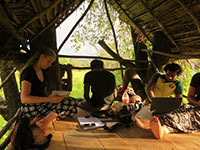
Rebecca working at the SLWCS
Rebecca spent the evening hours staked out in a tree hut watching the woods where the elephants commonly emerged, as well as a busy pedestrian road. Rebecca recorded how many people she saw, their form of transportation, their direction and approximate speed, and their noise level, as well as the number of elephants she saw and their approximated age and gender.
“I spent several hours one evening observing a small group of elephants broken off from their larger herd. The matriarch was fierce and protecting of the smaller female and two young elephants. The longer I watched the elephants, the easier it became to see they had personalities and societal structures of their own; I had never realized that I could become so involved with and care about these creatures.”
After each data collection, she turned in her work to the SLWCS. Her work with the organization was especially beneficial because the SLWCS provides dual services of creating sustainable solutions to the human-elephant conflict and educating the people in proper treatment of elephants and the development of mutual respect for boundaries between elephants and humans.
Even though Rebecca was only there a few weeks, she started to see results, particularly in the form of two projects: Project Beehive and Project Orange.

Project Beehive
“The original goal was to put a fence around the National Park, but the elephants don’t care if there’s a fence around their park and every single time they dismantled the fence. Then they tried to put the fence around the people, which was a big movement. Don’t fence the elephants in, fence the people in.”
This method worked much better. However, elephants would still rather eat rice and bananas, and if there was a fence keeping them away from the fields, they would still break through it to get to the crops. Fencing people in would not be a long-term, sustainable solution.
Project Beehive and Project Orange offered alternate ways of fencing: Project Beehive uses linked bee hives to fence in fields (bees are a major deterrent to elephants), and Project Orange assists farmers with switching their rice crops to orange crops, which elephants don’t eat.

Project Orange
“Project Orange was a huge shift because elephants hate citrus. They also hate the bees, and if they upset the beehive fence and provoke the bees into coming out, the elephants will run away to escape the small stingers, leaving the crops intact. I definitely saw change and progress with these two efforts.”
This project is having an immense, direct, and long-term impact on the lives of hundreds of Sri Lankan people. Rebecca’s contribution may seem small, but in the grand scheme, the research she conducted is actually changing lives. Families are sleeping soundly knowing their crops are protected by the bee fence, and they are earning more from the orange crops and honey harvests than they were with the rice yields.
The SLWCS is still continuing its research efforts, and while Rebecca was only there for a brief visit, she felt transformed by the entire experience. When she returned to Notre Dame, she made some major educational changes: she picked up a supplementary major in Peace Studies; she dropped her psychology major; and she shifted her political science focus from domestic to international politics. She even dropped all five of the classes she was registered for before leaving for Sri Lanka, and she completely reworked her schedule.
She is now taking a Peace Studies course called “How to Change the World,” for which she is looking into non-violent social change in the Sri Lankan government as her term-paper project for the course. She’s also taking a Chinese religions course, inspired by the Buddhism and Hinduism she encountered throughout Sri Lanka.
“Sri Lanka changed something about me; I understand things in a different way now. Once you hit that, there’s no going back.”
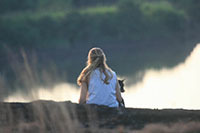
On the mountain top
She wants to continue doing research at Notre Dame. Sri Lanka is still recovering from a Civil War six years ago, and Rebecca hopes to study that. She is especially interested in exploring the part that peacebuilding and country constitutions can play in building a country. She’s working on proposals for future research on the Sri Lankan government, and elsewhere in Asia. She plans to write a senior thesis related to these experiences.
When talking about the future, Rebecca is hesitant. She wants to live abroad after graduating from Notre Dame, though she’s not sure where, and she’s thinking of making international law a career, but is still exploring her options.
“The thing is, Sri Lanka completely shook my world, and so I’m a little bit unsure of the future. Of course, the more I progress into this semester and my studies, the easier it is becoming to clearly focus on goals moving forward.”
Rebecca has three more years to discern “what comes next” for her future after Notre Dame. With Sri Lanka as part of her past, and Political Science and Peace Studies in her future, there is no doubt she will continue to learn, grow, and change the world.